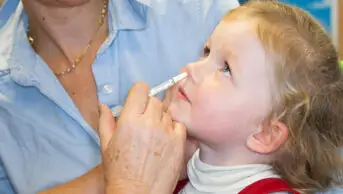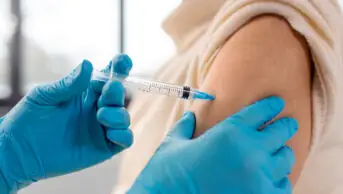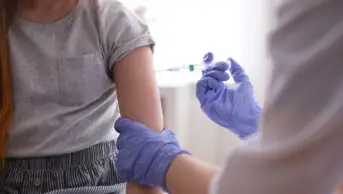
Shutterstock.com
Steve Brine, chair of the House of Commons health and social care committee, has called for the measles, mumps, and rubella (MMR) vaccine to be delivered through community pharmacy amid a surge in measles cases.
Speaking at a debate on measles on 22 January 2024, Brine asked health minister Maria Caulfield if she would commit to “a much more flexible delivery model for vaccinations, including through pharmacy”.
In response, Caulfield said that Brine was “right about using pharmacy, with Pharmacy First as a model to make it even easier for people to come forward”.
She added: “The real barrier is people’s reluctance to get vaccinated for a variety of reasons, whether it is vaccine fatigue through COVID-19 or because they missed their routine appointments and find it difficult to come forward to an extra clinic.”
Caulfield warned that uptake of the MMR jab in England is 89.3% for the first dose at age 24 months and 84.5% for the second dose at age five years, which falls below the World Health Organization’s recommendation of at least 95% coverage to maintain population protection.
She added that NHS figures show that “almost 3.5 million children under the age of 16 [years] are unprotected”.
On 19 January 2024, the UK Health Security Agency (UKHSA) declared a national incident regarding the measles outbreak.
In its statement, the UKHSA cited data that revealed there had been 216 confirmed cases of measles and 103 probable cases of measles in the West Midlands between 1 October 2023 and 18 January 2024.
Jenny Harries, chief executive of UKHSA, called for “immediate action” to boost MMR uptake across communities where vaccine uptake is low.
In response to the crisis, Leyla Hannbeck, chief executive of the Association of Independent Multiple Pharmacies, told The Pharmaceutical Journal that she believed community pharmacies should be “the first port of call for vaccination programmes because they provide accessibility and continuity to patients”.
She added: “They have experience of vaccinating and have demonstrated how effective they are in doing this.
“We have always said we are keen to support the NHS. But any service provided through community pharmacy must be commissioned appropriately to allow time and headroom for community pharmacy teams to prepare.”
Claire Anderson, president of the Royal Pharmaceutical Society, said: “Community pharmacies are well placed, at the heart of communities, to deliver vaccination programmes, as we have seen in the success of flu and COVID-19 vaccinations.
“We would support a move to allow pharmacists to offer MMR vaccines but it is vital pharmacists get the support they need to maximise vaccine uptake in their local communities and help ensure people can benefit from these life-saving interventions.”
Meanwhile, new guidance for risk assessment and infection prevention and control measures for measles in healthcare settings, published by NHS England on 18 January 2024, says that people with measles are most likely to contact primary care first “including general practice, community pharmacy, dental, and optometry (eye health) services”.
It recommends that staff be aware that patients with fever and rash are potentially infectious and “take appropriate action to stop onward transmission without delay”, including the use of personal protective equipment.
A spokesperson for the NHS said: “GPs and their teams are doing a good job of safely vaccinating children, and their efforts last winter led to around a 10% increase in the number of MMR vaccinations delivered to children compared to the previous year.
“The NHS is contacting millions of parents and carers of children to book their children in for an appointment with a GP for their missed MMR vaccine to tackle the current resurgence of measles, and more widely the NHS continues to explore ways of pharmacies delivering vaccines to children.”


